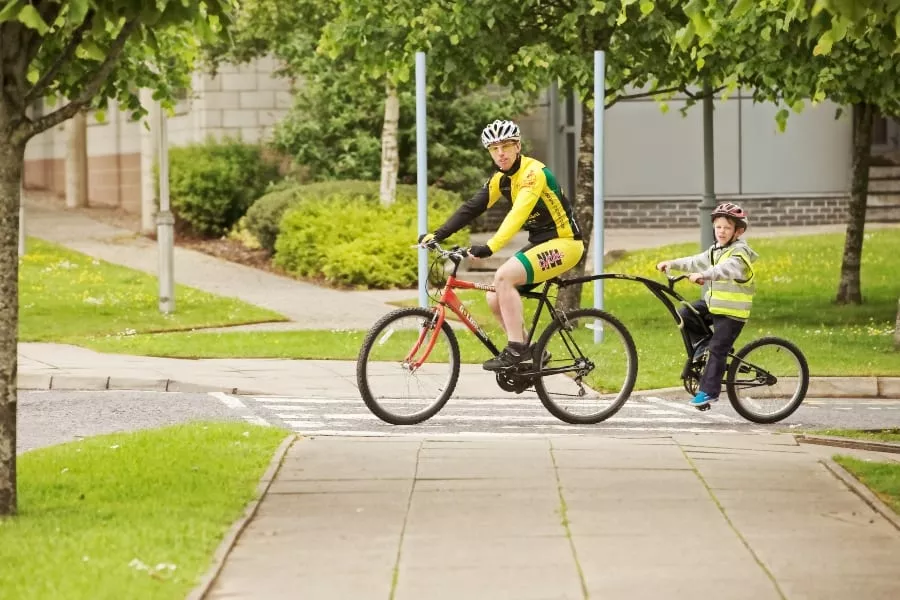
Cycling is an activity enjoyed by people of all ages, offering a great way to stay fit while having fun and exploring your surroundings in the open air. However, bike riding can also be dangerous if riders are unaware of its risks and do not take precautions to ensure their safety on the road. This guide will cover important bike safety points, tips for avoiding bike accidents, and ways to protect yourself should one occur.
Benefits Of Cycling
Cycling offers numerous health benefits, including improved cardiovascular fitness, stronger muscles and bones, increased energy levels, and stress relief. It also provides a more eco-friendly way of getting around while allowing riders to explore the outdoors excitingly and conveniently.
Hazards of Cycling:
Unfortunately, bike riding can be risky due to potential bike accidents that can occur due to reckless drivers or careless bike riders. Cyclists must remain vigilant and aware of their surroundings to stay safe on the road. Additionally, bike safety should always take priority over speed or convenience when it comes to bike riding.
Tips For Staying Safe On The Road
Here are some tips for staying safe on the road while cycling:
Wear a Helmet: Wearing a helmet is the most critical safety measure for bike riders. A bike helmet can drastically reduce the chances of head injury should an accident occur.
Be Visible: Make sure you’re visible to other motorists by wearing bright colors or reflective gear while riding. Additionally, bike lights and reflectors should be used when riding in low-light conditions.
Follow Road Rules: Obey all traffic laws and signals, ride with traffic instead of against it, and make eye contact with drivers at intersections to ensure they see you. Also, remember to use hand signals when turning or stopping to alert other vehicles on the road.
Avoid Distractions: Riding with headphones or using a phone while bike riding can be distracting and dangerous. Remain aware of your surroundings when bike riding to anticipate potential hazards or dangers.
Check Your Bike: Make sure your bike is in good condition and regularly check for potentially worn or damaged parts. Additionally, inspect tires and brakes to ensure they work appropriately before each ride.
Be Prepared: Bring along a bike repair kit that includes a spare tube, tire levers, a pump, and basic bike tools. It’s also essential to bring along a fully charged cell phone in an emergency and water and snacks so you can stay hydrated and nourished during long rides.
Ride with Friends: Ride with friends or family when possible, as this will help increase visibility on the roads. Additionally, having someone else around can offer extra protection should an accident occur.
Be Aware of Animals: Be aware of animals on or near bike paths and roads. If you suddenly come across an animal, stop and move away slowly to avoid startling them.
By following these tips, bike riders can ensure they stay safe while enjoying the many benefits cycling offers. Stay alert and follow bike safety protocols when bike riding to help ensure a safe and enjoyable experience.
Bike Safety Gear Essentials
In addition to a bike helmet, wearing gloves and protective clothing such as long pants and closed-toe shoes can help protect you from scrapes and cuts should an accident occur. Additionally, bike locks are essential for protecting your bike against theft when it’s parked.
What To Do If You Get Hurt Or Injured
Should an accident occur, bike riders should take the following steps to protect their safety and well-being:
- Get off the bike if possible and move away from traffic.
- Call 911 for medical assistance.
- Contact a bike shop or mechanic for help with bike repairs or replacement parts.
- Document any injuries sustained in the accident and details of what happened, including names, contact information, and insurance information of other parties involved.
- Report your bike accident to the police if required by law and obtain a copy of the police report if available.
6 Finally, seek legal advice if necessary to determine whether you may be eligible for financial compensation due to bike accident-related injuries.
Bike safety is paramount when cycling to avoid bike accidents and stay protected on the road. Awareness of the risks associated with bike riding and taking proper precautions, such as wearing a helmet and following road rules, can help bike riders remain safe and injury-free. Additionally, bike safety gear such as bike gloves and protective clothing can provide extra protection against scrapes and cuts should an accident occur. By following these tips and advice for bike riding, cyclists can enjoy the activity safely and securely.



















![Fan Expo Chicago [Convention], Donald E. Stephens Convention Center, 16 Aug What You Need to Know](https://www.thefreemanonline.org/wp-content/uploads/2024/09/Fan-Expo-Chicago-Convention-Donald-E.-Stephens-Convention-Center-16-Aug-What-You-Need-to-Know-74x55.jpg)
![Error [err_http_headers_sent] Cannot Set Headers After They Are Sent to the Client How to Fix](https://www.thefreemanonline.org/wp-content/uploads/2024/09/Error-err_http_headers_sent-Cannot-Set-Headers-After-They-Are-Sent-to-the-Client-How-to-Fix--74x55.jpg)